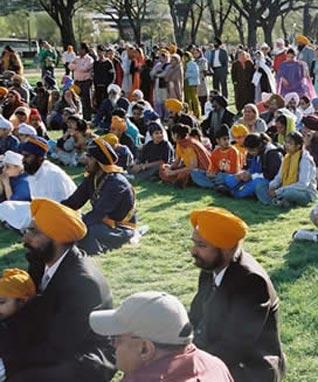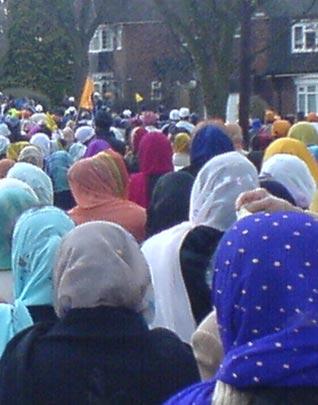Columnists
Sarbat Khalsa Ji Ki Ardaas
Ardaas, Part Six
The Talking Stick Colloquium # 38, Nov 29 - Dec 5
Convenor: RAVINDER SINGH TANEJA
THE DIALOGUE - So Far
"What is a Head Worth?" the theme of our discussion last week, was meant to parse the many layers of meaning in the line, "Dharam heyt sees dittey." In the ardaas, we remember (lest we forget) the martyrs who have sacrificed their lives through the centuries, at the hands of a variety of tyrants and oppressors, for standing witness to the Faith. We recall them as "sachiyaars," because they submitted to the writ of Hukam.
For Bhai Taru Singh, Shahbeg Singh, Mati Das and countless others, hukam appeared in the form of physical death which they embraced from a sense of righteous duty (dharam).
But submission or surrender to hukam need not always involve such draconian life and death choices. Hukam operates in our daily lives as it did in the lives of the martyrs we remember. It demands moral and ethical choices at every turn.
How do we measure up is the real question.
THIS WEEK
Prithmay sarbat khalsa ji ki ardaas hai ji/ sarbat Khalsa ji ko Waheguru Waheguru Waheguru chitt aavey/ chitt aavan ka sadkaa sarab sukh hovey/ jahaa(n) jahaa(n) Khalsa ji sahib, tahaa(n) tahaa(n) rachhey-aa riaa-yet, degh-tegh fateh/ birdh ki paij/ panth ki jeet/ Siri Sahib ji sahaai/ Khalsa ji kay bol baalay/ bolo ji Waheguru
First and foremost, the entire Khalsa nation petitions:
May the Khalsa remain forever fixed in Waheguru,
And may that remembrance
be the source of all blessings.
May the presence of the Khalsa
Assure security and protection,
The truimph of charity and
valor,
And victory to the Panth.
God - The Sword - be our protector!
May the Khalsa always be in chardi kalaa - Let's all join in saying: Waheguru!
THE MESSAGE
This passage of the ardaas, incorporated during the eighteenth century, is a prayer of petition, a political manifesto and, above all, a reflection of the collective consciousness and will of an emerging Sikh nation.
"Sarbat Khalsa" refers to the annual gatherings of Sikhs, held during the century between the death of Guru Gobind Singh and 1805 to address matters of common concern.
Sikhs were the victims of a sustained period of genocide during the eighteenth century. Recognized by their unshorn hair, they were hunted down and killed for a bounty offered by the Mughals and their supporters. Their families were killed and their possessions seized by the State. The addition of these lines during such an intensely adverse period speaks to the Chardi Kala of the Panth.
At the very outset, the first blessing sought is the gift of Naam, because Naam is the source of all happiness.
"Jahaa(n) jahaa(n) Lhalsa ji sahib" alludes to the physically scattered Khalsa at the time. But the line also hints at the fact that the entire world is the Khalsa's bailiwick. The Khalsa is not bound by geographical boundaries or wrapped in any political flag; rather, the Khalsa is protected by the Akal Purakh while undertaking the work of charity, public welfare and striving for victory of the Panth.
LET'S PONDER TOGETHER
The first line, "Prithmay sarbat Khalsa ji ki ardaas ..." is striking and invites some attention, especially when contrasted with the first line of the subsequent passage which we will consider next week.
Is there a distinction implied in between this line and the one that follows: "Sikhaa(n) noo(n) sikhi daan/ kesh daan/ rehat
daan/ bibek daan."
The passage under consideration speaks exclusively about the Khalsa, whereas the next passage refers to "Sikhaa(n) noo(n)." Is Khalsa and Sikh different here? Or are the terms being used interchangeably?
Guru Nanak has a keen sense of mission, reflected in his writing, which aims at nothing short of a new civilization. The institution of the Khalsa can be seen as the logical - and historical - development of Guru Nanak's mission, and the Sikh Raj as its political manifestation.
Would that be a fair assessment?
November 29, 2010
Conversation about this article
1: Mohan Singh (Toronto, Ontario, Canada.), December 02, 2010, 12:31 PM.
Early in the eighteenth century, Sikhs were outlawed by a royal edict of the Mughals, and faced violent death wherever sighted. In their scattered places of refuge - jungles and deserts - they prayed collectively or severally, seeking God's protection for the entire Khalsa wherever they may be. The words have become a permanent part of the ardaas. This is to keep the spirit of Sikhi and the Khalsa panth alive. They struggled for the Chardi kalaa of the panth. Today, we face similar challenges, though they appear in a different form. Therefore, we continue to ask Waheguru for "Sikhaa(n) noo(n) sikhi daan/ kesh daan/ rehat daan/ bibek daan ..." And furthermore, we also ask for "bharosa daan" and "vissah daan."
2: Ravinder Singh Taneja (Westerville, Ohio, U.S.A.), December 05, 2010, 10:08 AM.
The attempt here was to stir a discussion on the Khalsa and its commitment to a new social order - a fact that does not seem to get much attention. But it is important for us to think in terms of what role we are to play in the society we live in. Accepting the status quo does not seem to be an option for Sikhs who must forever be the voice of Justice and Truth. That is possible only if we begin with ourselves.
3: Gurdev Singh Bir (Columbus, Ohio, U.S.A.), December 05, 2010, 11:51 PM.
The Sikh inculcates into his life the spiritual qualities and the knowledge necessary to evolve or graduate into the Khalsa. The next lines mention the virtues necessary for the Sikh on that journey to qualify as the Khalsa. Having the discipline and necessary mentoring, I feel that the Khalsa is the culmination point of the spiritual, physical and knowledgeable Sikh.




